The Duke Master of Science in Global Health (MS-GH) is offered jointly by the Graduate School and the Duke Global Health Institute, an interdisciplinary unit that leverages outstanding faculty from across Duke to take on the most complex health challenges facing the world today.
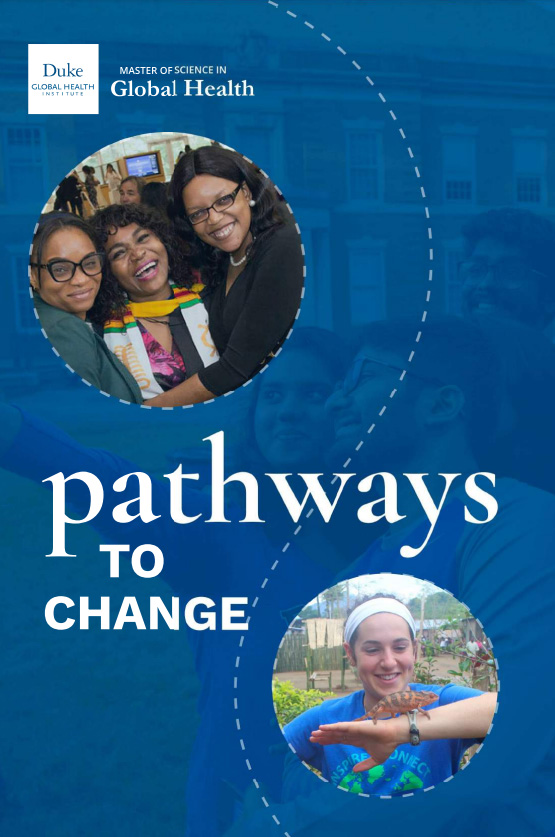
Our unique approach to global health offers:
- A small cohort of diverse students from around the world
- Individual attention from dedicated faculty and staff through small classes and one-on-one mentoring
- A strong culture of innovation and collaboration
- Duke’s commitment to knowledge in service of society
- Exceptional student services and resources
- A beautiful campus in a thriving city
As a student in the Master of Science in Global Health program, you will learn:
- How to identify and assess current and emerging global health challenges
- The influence of environmental, economic, social and political factors on health
- Culturally and ethically informed research methods and technologies that can aid health interventions
- The role of health policy and systems at local, national and international levels
The MS-GH program now carries the official STEM designation, giving international students whose jobs meet certain requirements 2 additional years to work in the United States.
You may also be interested in ...
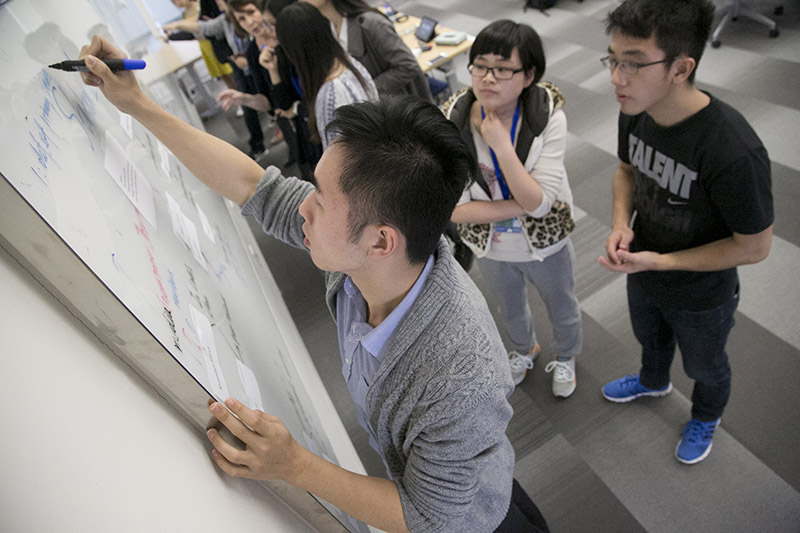
MS-GH at Duke Kunshan University
Looking to study global health in Asia? Check out our affiliated MS program offered by Duke Kunshan University in Kunshan, Jiangsu Province, China.
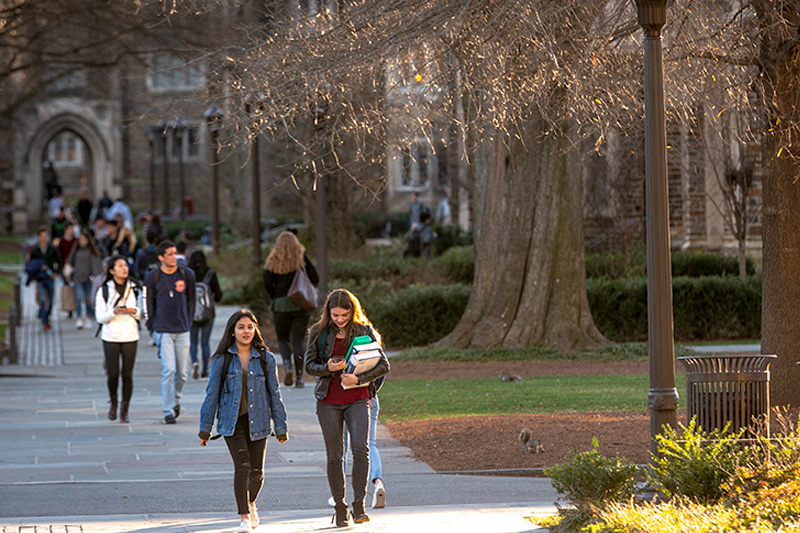
Accelerated MS-GH Program
For select Duke undergraduates interested in global health, we also offer an Accelerated MS program that allows you to earn both a bachelor’s and a master’s degree in five years.
Program Features
Flexible, Interdisciplinary Coursework
MS-GH coursework is guided by the principle that complex global health challenges require a multidisciplinary, multisector approach that leverages diverse perspectives. Our faculty include experts in medicine, engineering, the environment, public policy, law, business, social sciences and the humanities.
Through a tailored, flexible curriculum, you will examine the larger context of global health. The 38-credit curriculum, requiring at least three full-time terms of study, focuses on:
- An understanding of key global health concepts and challenges
- A solid foundation in core methodologies used in global health research
- Ethics training and considerations applicable across cultures
- Core concepts to help students evaluate and understand health systems
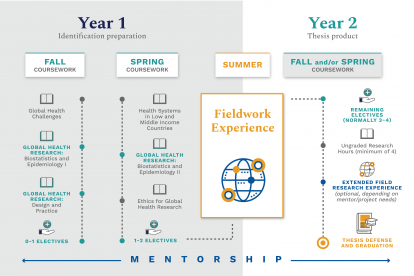
Guidance from Caring Experts
Our global health faculty are innovative thinkers and problem solvers. But most of all, they are invested in your learning and professional development. You’ll receive one-on-one mentoring from a faculty advisor, as well as opportunities to learn alongside experts from a range of disciplines.
 Experience in the Field
Experience in the Field
Hands-on learning is a hallmark of our global health education. In the MS-GH program, you’ll work closely with faculty mentors, project teams and organizational partners to identify and develop research projects and internships that includes at least 10 weeks of applied field experience. Field research typically occurs between the first and second years of the program.
MS-GH students have done fieldwork in more than 30 countries. Your field experience will be fully funded, including travel and research expenses. We’ll also help you prepare, with workshops on ethical engagement and respect for local cultures and practices.
Careers with Impact
By the end of our two-year program, you will have a unique combination of skills, knowledge and hands-on experience necessary to make an impact in improving the health and well-being of people around the world. In addition to coursework, mentorship and field research, you will interact with visiting global health professionals and receive career advising, skills-based workshops and professional development support.
Our alumni have become researchers and leaders in NGOs, academia and private industry. Many pursue further education at top-rated institutions while others forge successful careers in healthcare. Among our graduates who have pursued careers, 82% are working in global health.
Meet Our Alumni
Pathways to Change
Our graduates share how the MS-GH program gave them the practical skills – and the inspiration – to pursue their goals.
Read More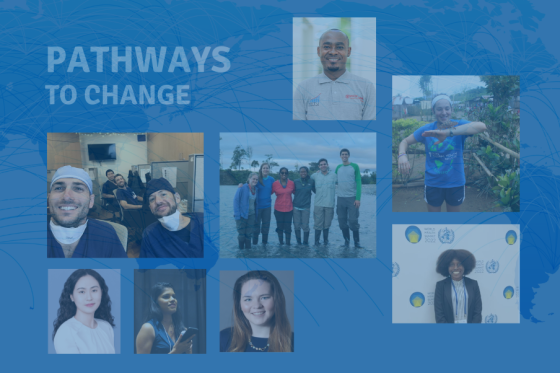
Requirements
35 credits of academic coursework
CORE COURSES (REQUIRED)
- GLHLTH 701 – Global Health Challenges (Fall), 3 credits
- GLHLTH 702 – Global Health Research: Design and Practice (Fall), 3 credits
- GLHLTH 705 – Biostatistics and Epidemiology for Global Health I (Fall), 4 credits
- GLHLTH 707 – Biostatistics and Epidemiology for Global Health II (Spring), 4 credits
- GLHLTH 740 – Global Health Ethics in Research, Policy & Practice (Spring), 3 credits
- GLHLTH 750 – Health Systems in Low and Middle Income Countries(Spring), 3 credits
ELECTIVES (FIVE COURSES, INCLUDING TWO FOCUSED ON RESEARCH METHODS)
4 CREDITS OF RESEARCH
10-WEEK FIELD-BASED PROJECT
ACADEMIC THESIS
Costs and Financial Aid
DGHI provides financial support to 100% of students enrolled in the MS-GH through:
- Merit-based scholarships, awarded on the basis of your program application
- Paid graduate teaching and research assistant positions
- Guaranteed funding for field research
- Guaranteed funding for professional development
- A tuition-free fourth semester for regularly-enrolled students in good academic standing
Annual tuition and fee rates are established by the Duke Graduate School.
If you would like to explore U.S. federal financial aid/student loan options, the Duke Graduate School Financial Aid Office can assist.
Scholarships and Fellowships
We award merit-based scholarships ranging from 10-75% of program tuition. International and US students are eligible for these departmental awards, and you are automatically considered for scholarships based on your Graduate School application – no additional application materials are required.
Duke University Peace Corps Coverdell Fellowship in Global Health
DGHI partners with the Peace Corps to offer targeted scholarships to returned Peace Corps volunteers (RPCVs). Through the Paul D. Coverdell Fellowship, eligible RPCVs enrolled in the MS-GH receive a 50% tuition scholarship, as well as funding to pursue field-based research and professional development activities. As part of the Coverdell fellowship, you will undertake a research or service project of value to underserved populations in the United States.
If you are eligible for and interested in this opportunity, please notify your DGHI coordinator when submitting your application.
Foreign Language and Area Studies (FLAS) Fellowship
Funded by the US Department of Education, the Duke Center for Latin American and Caribbean Studies offers a competitive Foreign Language and Area Studies (FLAS) fellowship. These fellowships require language and area studies coursework in addition to global health requirements and are an excellent way to increase your preparedness to undertake a career in global health in that region of the world.
Application deadlines typically fall in January/February. If you are interested in applying, notify your DGHI coordinator before submitting your application.
How to Apply
Applications for the Fall 2026 MS-GH class are open! You can begin or continue your application through the Duke Graduate School. Our application deadline is Friday, February 27, 2026.
Here’s what you’ll need to complete your application:
- Statement of purpose
- Three academic letters of recommendation
- Transcript(s) from each post-secondary institution attended
- Evidence of preparation in quantitative methods, research, and/or academic writing
- Official TOEFL, IELTS, or DuoLingo scores (international applicants only)
- Official GRE or MCAT scores are optional for the Fall 2026 admissions cycle
Application Fee Waiver
**Fee waiver applications are now closed for the 2025-26 application cycle.** DGHI offers a fee waiver option to support prospective students who may be experiencing economic stresses. To be eligible to request a DGHI application fee waiver, you must be a non-US citizen, in good academic standing and demonstrate high financial need.
The Graduate School also offers an application fee waiver option to support prospective students who are United States citizens (or permanent residents) from various populations, including those who may be experiencing economic stresses. Visit the Graduate School's website to learn more about this fee waiver.
Questions? Contact:
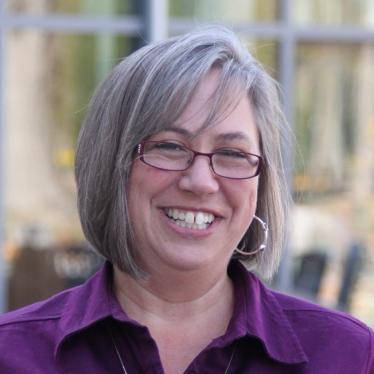
Lysa MacKeen
Deputy Director of Academic Programs
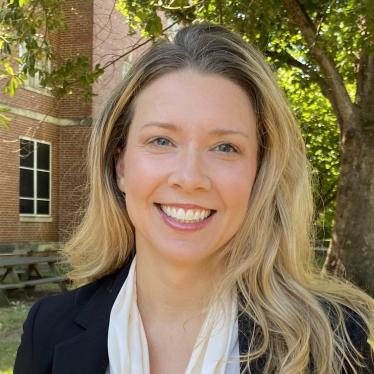
Amanda Frederick
Senior Graduate Admissions Coordinator